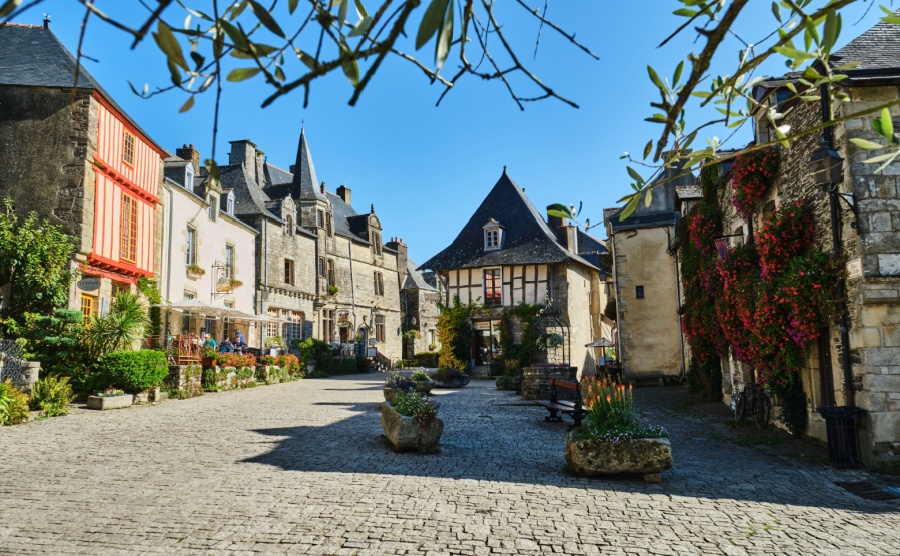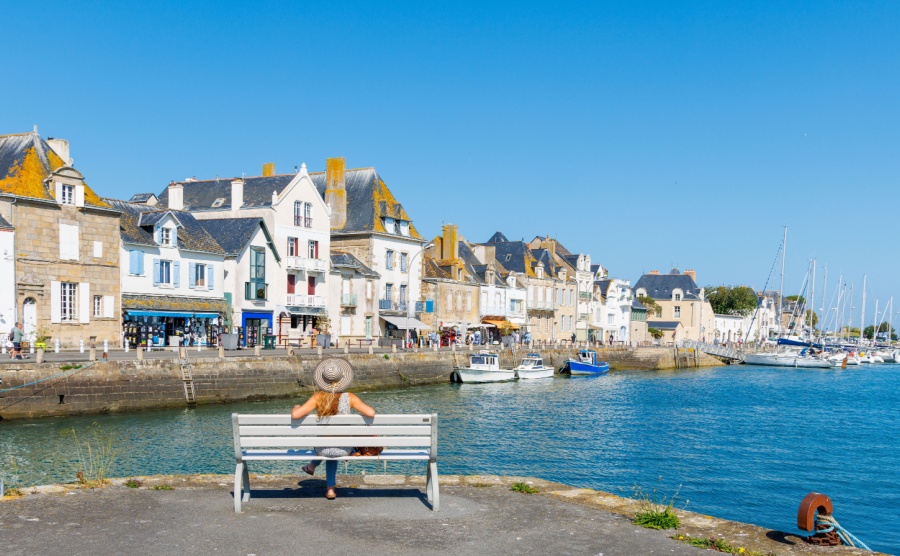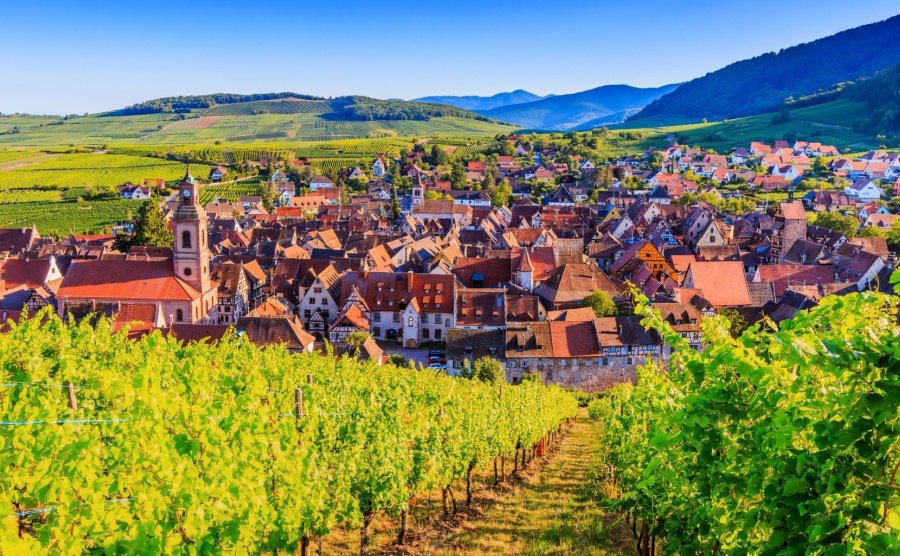Will it be like the opening of Beauty and the Beast? (You have seen it haven’t you? Check it out here). Belle, strolling through the village, past the boulangerie, through the flower market, bantering with the washerwomen, saying bonjour to all and sundry… But what is it really like to live in a French village?
When choosing our dream location in France, many of us are attracted by the thought of village life. In our recent survey, 54% of readers said they would look for a village home.
We can guess that the appeal is for a slower pace and a better quality of life. We’ve certainly seen the dream played out in books like A Year in Provence, and our “prettiest villages in France” articles are always well clicked! But just how possible is it to find that perfect French village and settle happily in there? And what aspects of village life should you consider when searching for that property?

Rochefort en Terre, France ( Jens Otte / Shutterstock.com)
A move to a French village is a significant change in life, with a large financial outlay. It’s important to get it right, ideally first time. Ask anyone who has relocated here what they may have done differently and it evokes lively discussion!
So it’s important to be realistic about your personal situation and plan effectively.
Find homes in France via our property portal.
Research is key
If research in preparation for that move has you watching idyllic scenes of French village life on books and TV – aspirational stories of people who made the move and never looked back – you need to dig a little deeper.
The more time you spend researching and planning your move, the more your wishlist will change and your aims focus. Consider all aspects of the move before you make that leap.
The right village property
French property generally offers great value for money, especially in rural areas. But it’s easy to get carried away by the size of property you can afford. Many of us buy bigger properties here than we could dream to afford back in the UK. That’s not always sensible!
That garden that seduced you on your first viewing will need constant upkeep. Will you be able to do it yourself? Or will you have to pay others to do it? If the latter you need to budget for this. If the former, you need confidence that your new enthusiasm won’t be dampened by the reality of the task. (Although, you can always claim to be rewilding!).
The same applies to the property size itself. While we all need room for visitors, inside space needs heating and maintaining. Outbuildings and barns may feel like a wonderful opportunity for those previously forced to live within small spaces, but consider carefully whether will you really use a yoga/weights/writing room.
Will the kids enjoy French village life?
We might think we are doing the children a favour by taking them to the space, better weather and beauty of France, but do the research first. Many will indeed love the life there. UNICEF scores French children’s wellbeing above the UK’s and US’s on almost every level.
However, many villages in France no longer have a school and children must travel further to schools outside of their immediate area. If you have children of varying ages it can mean school drop offs and pick-ups to more than one school, none of which may be just down the road.
If you’re planning to move with children and are choosing a French village, consider their needs first!
When it comes to settling in, younger children are likely to adapt better, while teenagers may need more help – it’s not easy being a teenager at the best of times. Either way you could be spending a lot of time driving them to playdates.
The simple message is, if you’re planning to move with children and choosing a French village, consider their needs first!
Getting around
You may be driving yourself to playdates too, as well as the shops and other appointments. Whilst some villages are lucky enough to have a local épicerie and bar, to go shopping in larger supermarkets is often a reasonable drive.
However, France has invested heavily in local transport services. Bus services are operated by local councils and are generally good, even in rural areas. France also has a good train network (with 50% more kilometres of track than the UK). It’s easy to check local transport routes via Google or sites like Seat61.com or Rome2Rio.
Bear in mind, too, the opportunities offered by electric bikes. Two out of three of our readers said they wanted to be within walking distance of shops and cafes, but what about hopping on an electric bike instead?
Transport links are of paramount importance for investigation if you are looking to embark on your French village life adventure.
Can village life be… too slow?
The pace of French village life may be slower than you have previously experienced. There is an ethos in France as a whole that nothing matters more than family and quality time spent with friends. Which is why so many people love this country. But if you haven’t made those friends yet?

The seaside village of Croisic, Brittany
This change in pace can come as a shock, even if you believe you’re prepared for it. Rushing around is simply not a thing. Encountering people on route to somewhere else, there is always time to shoot the breeze. Things which you may be in a rush to get completed will get done when they do. This is simply the way life is here. You will either learn that patience really is a virtue or go mad very quickly.
The Mairie: hub of French village Life
The good news is that most villages, no matter how small, have town halls – the Mairie. This is where the mayor and local council sit. They are the hub of French village life and you will use this valuable resource more than you may realise.
As well as knowing what activities take place in the village, the Mairie arrange and publicise events within their commune. From hog roasts, to antique sales, the best place to find out what is going on and coming up is the Mairie.
See the Mairie as the representative of village opinion and work with them.
You will also without doubt have cause to seek their assistance when planning renovations and work on your property. This is highly regulated in France for the simple reason that the French – your new neighbours – don’t want you ruining their lovely village! See the Mairie as the representative of village opinion and work with them. Work resulting in any change to the exterior view of your property needing building regulation planning application approval, which is also done through this office. They will happily walk you through this and offer invaluable help when it seems overwhelming.
Other practical considerations
Other factors to consider when looking into French village life include:
Is there a shop or bar?
Or if a bigger village, perhaps even several of them? While some villages are lucky enough to have a bar or small epicerie, many communes do not. This willn impact how you meet and integrate with neighbours. It can mean that other than wandering around meeting your fellow villagers outside their houses (one of the biggest joys of French village life), integration may take more creativity.
How seasonal is it?
Another consideration is if moving to a lively village, is it lively all year round or simply during the summer tourist season and much quieter during the winter? Is there a doctor and dentist either in the village or within easy reach from it. How would you get there if you couldn’t drive for any reason?

Riquewihr
Integration into French village Life
Congratulations! Now the hard work is done and you have moved in, all that remains is to meet your fellow villagers. The easiest way to start the process is simply to go out for a stroll through your village on a sunny day. This often removes the daunting task of having to door knock as this is when you will find people outside. The more effort you can make with the language, the easier this will be. But you will also be surprised how expats tend to naturally find each other, if in need of conversion in your native language.
However integration vetting beyond the expat community is especially important for your new French village life. Taking the time to create friendships and networks will repay you tenfold. Offers of help, reciprocal support in times of need, gifts of vegetables and fruit, as well as invitations to social events are some of the biggest delights of French village life.
Personally, there is nowhere I would rather be than living my best French village life!










